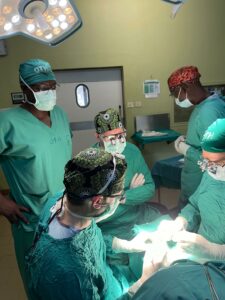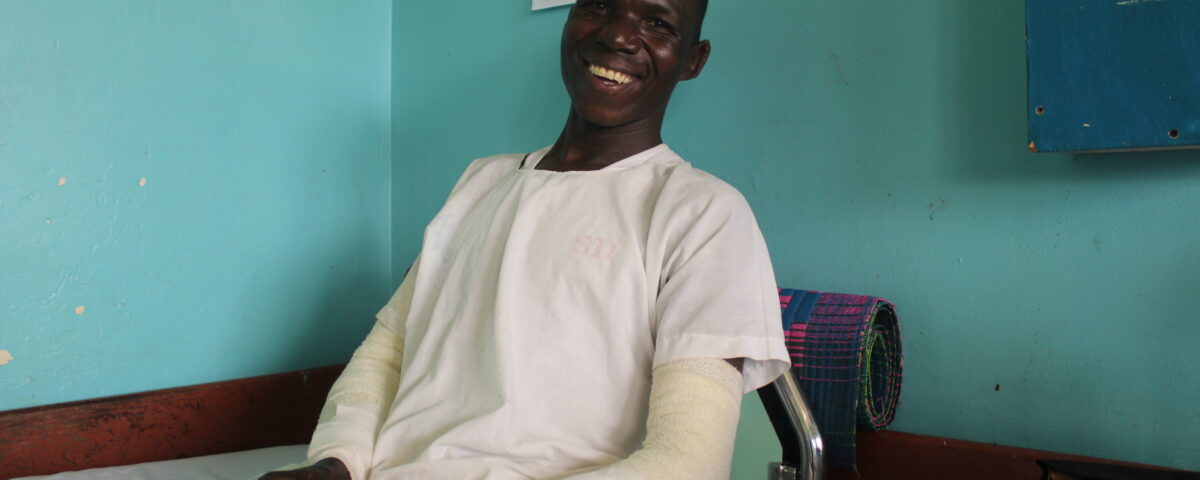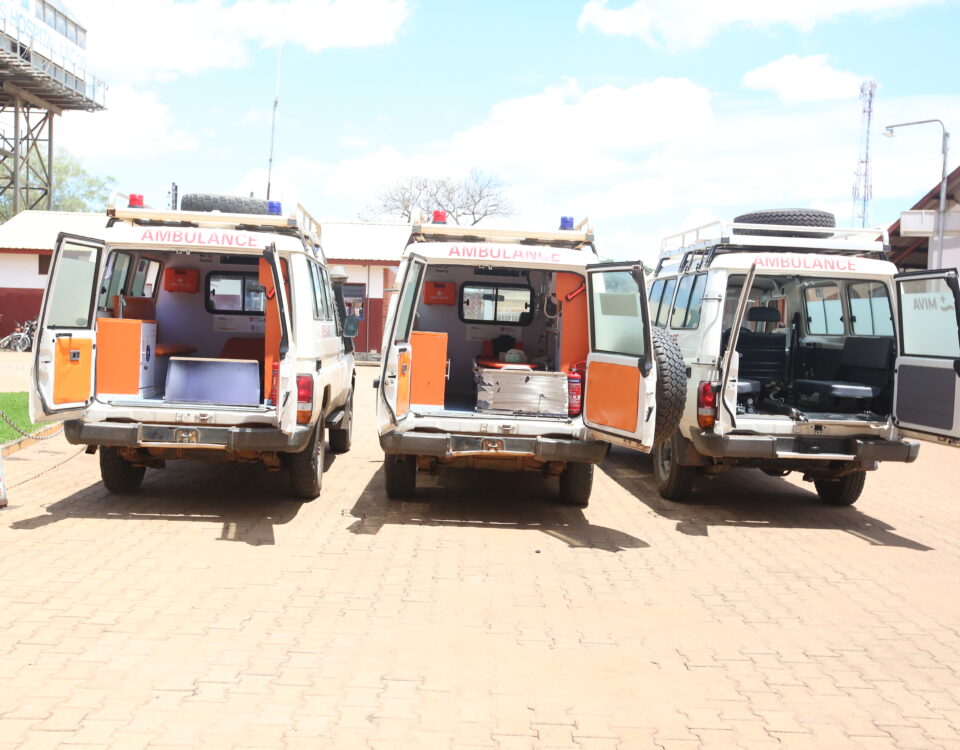Three years ago, on a night that seemed peaceful and quiet, Nyeko Justine and his wife said goodnight to their two children, Lagum Liona and Rubangatwero Jonathan, who slept in a hut at the edge of their compound. All appeared well until a father’s instinct was ignited by piercing screams that shattered the tranquility.
Nyeko rushed out of their hut, only to find his children’s home engulfed in flames. Smoke billowed into the night, and at the horrifying sight, his wife collapsed. Neighbors began to gather, but he couldn’t wait – he had to save his children. “I couldn’t let fear win,” he recalled later. “Not while my children cried.”
Without a moment’s hesitation, he kicked open the door and plunged into the inferno. Heat scorched his skin, and smoke choked his lungs.
Guided only by the whimpers of Lagum and Rubangatwero, he found them curled together, trembling in terror. He scooped them up, but fate struck back; the roof caved in, a torrent of sparks and ashes burying them all. Neighbors armed with buckets and bare hands rushed in, dragging them from the wreckage.
They were hurried to Anaka Hospital, but days later, his four-year-old daughter Lagum succumbed to her injuries, her little body unable to fight the flames.
Though Nyeko and his son survived, their scars ran deeper than skin. Nyeko’s arms, once strong from years of farming, now hung stiff like iron rods—a cruel reminder of the night he became both shield and victim.
For five months, Nyeko was hospitalized at St. Mary’s Hospital Lacor, mending his flesh but unable to heal a father’s grief.
Upon returning home, he faced a harsh reality: How could he farm with arms that refused to bend? “I felt useless,” he admitted. As a local council leader, he sought help from his community, and neighbors graciously tilled his fields. Their kindness was both a comfort and a burden. Yet Nyeko’s spirit, like land parched from drought, refused to wither.
Then, he heard the life-changing news on the radio about free reconstructive surgeries at Lacor Hospital. He froze, tears pooling in his eyes. “God hasn’t forgotten us,” he said.
Determined, he registered a week ahead of surgery day. Nyeko wasn’t leaving anything to chance; that’s why he waited for four days at Gang Welo (Waiting Home).
When the day finally arrived, he was screened and examined. The doctors advised, “One arm first.” His heart sank—but then came surgery day. Miraculously, both his arms were freed from their scarred prisons. Bandaged yet reborn, Nyeko wept. “Now,” he vowed, “I’ll work twice as hard.”
In Surgery II, after his operation, Nyeko flexed his fingers, once frozen in agony, now bending and stretching. “These hands buried my daughter,” he said softly. “Now they’ll feed my son.”
To the surgeons, he offered a farmer’s gratitude: “God will bless them, but I’ll thank them too—with every harvest.”
Nyeko’s story is not just about fire or survival. It’s about fathers who become flames to save their children. It’s about communities rising from the ashes. And it’s about a hospital in Northern Uganda stitching hope into the fabric of broken lives.
Today marks a new beginning for Nyeko. With each turn of the soil, he is ready to face the world, promising to care for his family with love. Every harvest will be a tribute to the surgeons and a way to show his gratitude, filled with prayers and blessings for Lacor Hospital.
d peaceful and quiet. Nyeko Justine and his wife said goodnight to their two children, Lagum Liona and Rubangatwero Jonathan, who slept in a hut at the edge of their compound. All appeared well until a father’s instinct was ignited by piercing screams that shattered the tranquility.
Nyeko rushed out of their hut, only to find his children’s home engulfed in flames. Smoke billowed into the night, and at the horrifying sight, his wife collapsed. Neighbors began to gather, but he couldn’t wait – he had to save his children. “I couldn’t let fear win,” he recalled later. “Not while my children cried.”
Without a moment’s hesitation, he kicked open the door and plunged into the inferno. Heat scorched his skin, and smoke choked his lungs.
Guided only by the whimpers of Lagum and Rubangatwero, he found them curled together, trembling in terror. He scooped them up, but fate struck back; the roof caved in, a torrent of sparks and ashes burying them all. Neighbors armed with buckets and bare hands rushed in, dragging them from the wreckage.
They were hurried to Anaka Hospital, but days later, his four-year-old daughter Lagum succumbed to her injuries, her little body unable to fight the flames.
Though Nyeko and his son survived, their scars ran deeper than skin. Nyeko’s arms, once strong from years of farming, now hung stiff like iron rods—a cruel reminder of the night he became both shield and victim.
For five months, Nyeko was hospitalized at St. Mary’s Hospital Lacor, mending his flesh but unable to heal a father’s grief.
Upon returning home, he faced a harsh reality: How could he farm with arms that refused to bend? “I felt useless,” he admitted.
As a local council leader, he sought help from his community, and neighbors graciously tilled his fields. Their kindness was both a comfort and a burden. Yet Nyeko’s spirit, like land parched from drought, refused to wither.
Then, he heard the life-changing news on the radio about free reconstructive surgeries at Lacor Hospital. He froze, tears pooling in his eyes. “God hasn’t forgotten us,” he said.
Determined, he registered a week ahead of surgery day. Nyeko wasn’t leaving anything to chance; that’s why he waited for four days at Gang Welo (Waiting Home).
When the day finally arrived, he was screened and examined. The doctors advised, “One arm first.” His heart sank—but then came surgery day. Miraculously, both his arms were freed from their scarred prisons. Bandaged yet reborn, Nyeko wept. “Now,” he vowed, “I’ll work twice as hard.”
In Surgery II, after his operation, Nyeko flexed his fingers, once frozen in agony, now bending and stretching. “These hands buried my daughter,” he said softly. “Now they’ll feed my son.”
To the surgeons, he offered a farmer’s gratitude: “God will bless them, but I’ll thank them too—with every harvest.”
Nyeko’s story is not just about fire or survival. It’s about fathers who become flames to save their children. It’s about communities rising from the ashes. And it’s about a hospital in Northern Uganda stitching hope into the fabric of broken lives.
Today marks a new beginning for Nyeko. With each turn of the soil, he is ready to face the world, promising to care for his family with love. Every harvest will be a tribute to the surgeons and a way to show his gratitude, filled with prayers and blessings for Lacor Hospital.


